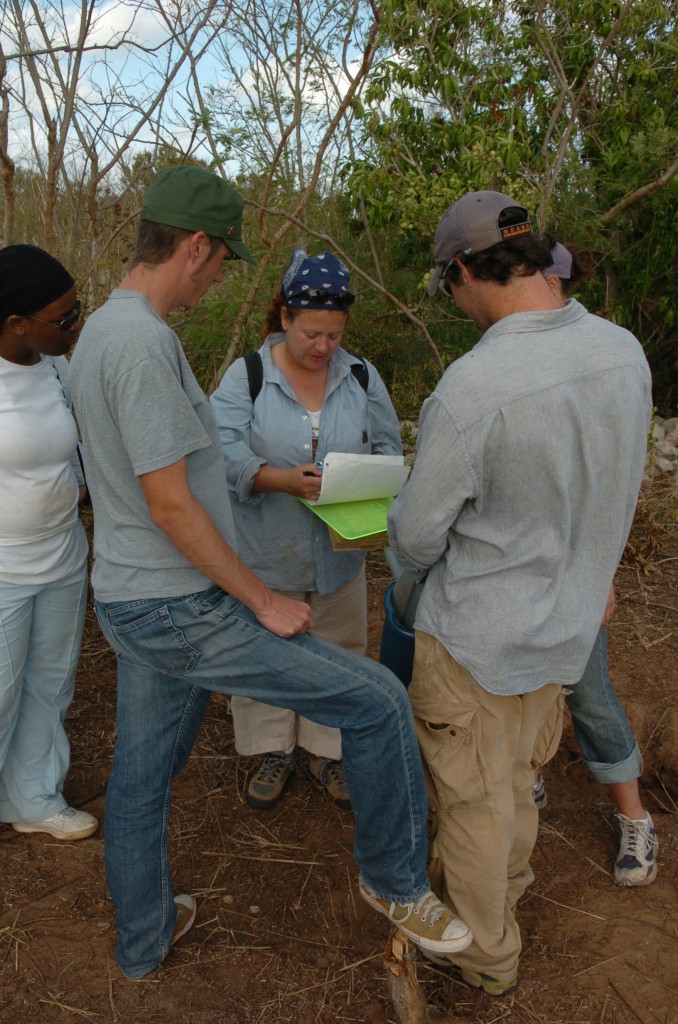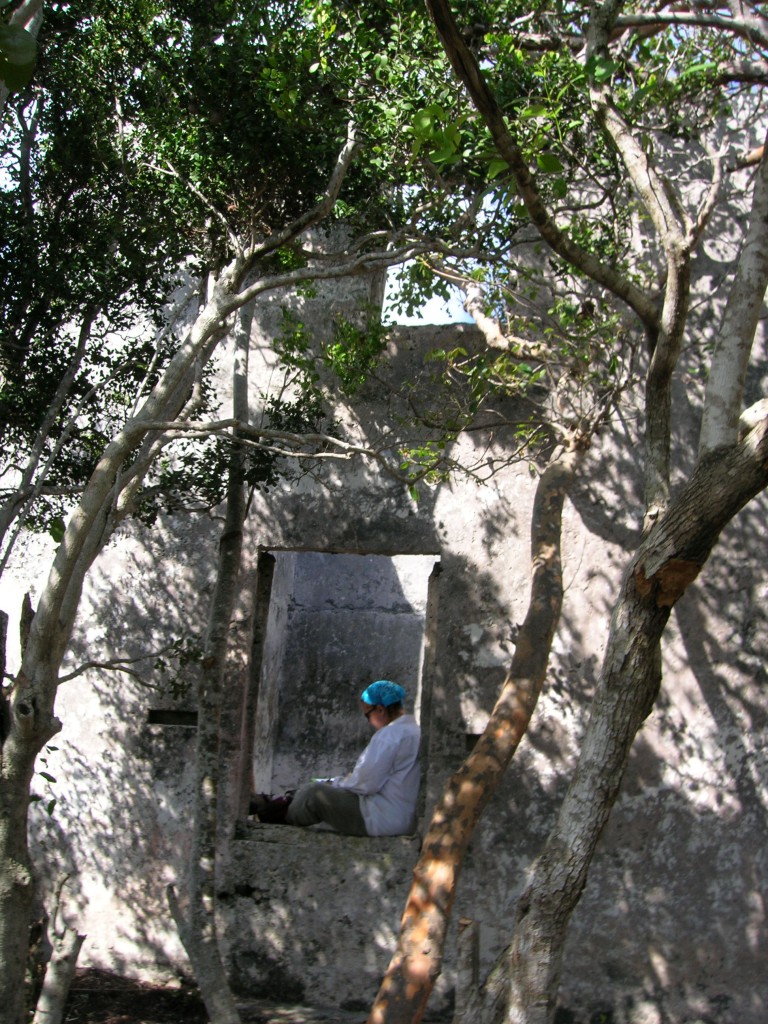[Savage Minds is pleased to run this essay by guest author Jane Eva Baxter as part of our Writer’s Workshop series. Jane is a historical archaeologist and an Associate Professor of Anthropology at DePaul University in Chicago, IL USA. She is the author of numerous books and articles, including the forthcoming book Childhood and Adolescence in the American Experience (University Press of Florida 2016). You can follow her on twitter @janeevabaxter.]
For the past couple of years, I’ve been suffering from the condition we affectionately know as “writer’s block.” This has not been a generic or widespread condition as much of my writing is progressing as swiftly and smoothly as my job structure allows. This particular writer’s block has been confined to the writing associated with several years of archaeological work I conducted on the island of San Salvador in The Bahamas. The reason for this particular condition is easy to identify: my project co-director simply decided to stop writing.
My co-director and I began planning our research in 2002, and from 2004-2012 we conducted archaeological and historical work investigating transitions in the daily life of the island’s residents. During this time, we co-authored conference papers, site reports, proceedings volume papers, and articles for the Journal of the Bahamas Historical Society. We often co-authored work with our students. We developed curricular materials for the local school, co-authored a popular guide to the historic sites on the island for residents, tourists, and student groups, and created archaeology posters for a small, local museum.
And then, my project co-director stopped writing. At first, this decision to stop writing manifested itself as a waning interest in what had become a rather routinized and comfortable process of co-authorship. Writing plans were disregarded. Deadlines were missed without renegotiation. Discussions about writing ceased. Eventually, he announced he no longer had an interest in publishing scholarly articles, and told me to just go ahead and write everything up on my own. For many, being freed from the bonds of co-authorship might seem liberating, but to me it has been rather paralyzing. It also has given me cause to reflect on the production of archaeological knowledge, and left me to wonder exactly what it means to write without him.
A few quick, general thoughts about fieldwork and writing
Archaeological research is always a collaborative endeavor. Regardless of the size of the project, an archaeologist never goes into the field alone. Collaboration in archaeology is not a choice or a particular research stance; it is a necessary requirement to get the work done. The relationship between a field project comprised of many individuals, and the writing process, generally undertaken by at most a few, is a complicated one.

A multiplicity of ideas and voices exist in the field as different project participants have their own engagements with the archaeological record. This diversity of experience moves through a variety of social (gendered, status-based) and organizational (personnel hierarchies) mechanisms and generally becomes distilled into a singular narrative (the book, the site report, the article) authored by the project director(s) (e.g., Berggen and Hodder 2003, Gero 1996, Roveland 2006). Alternative ideas, different perspectives, and contrasting opinions that existed during fieldwork are rarely part of a final narrative (but see some publications of the Colorado Coalfield War Project written as the “Ludlow Collective” where the contents of the writing are attributed to the entire project team). The archaeological voice is almost always a singular one, even when the research comes from the collective efforts of many.
Some specific reflections on losing my co-director and writing
Losing my co-director as a writing partner made me acutely aware of this particular dynamic in archaeological work, and of a certain kind of responsibility that exists in archaeological writing. How is one person writing alone supposed to become the voice for over a decade of collaborative thinking?
On the positive side, I realized my own writing crisis stems from a healthy, open working dynamic cultivated over so many years. It was this positive dynamic of sharing and negotiating knowledge freely that has made it so difficult for me disentangle my voice from my co-director’s. I have repeatedly revisited the countless hours deliberately spent in thought together around issues of project design, logistical planning, student evaluation, and archaeological interpretation. Through these interactions we jointly had made every critical decision about how our field project was to be run, and how we wanted to approach every aspect of our analysis, teaching, and writing.
More poignant in my reflections were recollections of the casual conversations that peppered our days both in and out of the field. Many of these interactions were fleeting: a few minutes of banter in the truck to or from the site, a moment on an airplane, a scribbled note at a conference, or a quick IM during the course of a workday. Other interactions were much more involved- like the times a “non-work” dinner became hijacked completely by wonderings about one analysis or another, or the evenings when lab work went on hours longer than necessary because ideas were flying back and forth. I don’t remember the specific outcomes of any of these interactions, but I am certain that these were the moments when my ideas and my voice became inextricably entwined with his. I also have become acutely aware of similar interactions I had over the years with project staff and my students, and the many ways their thoughts and voices have become a part of my own.

At the end of the day, it has become my responsibility as the last project director standing to “write it all up” and disseminate the work of this collaborative project as widely and appropriately as possible. Writing in archaeology is always about taking responsibility for the different voices in our narratives. Historical Archaeologists have long characterized their work as bringing lost or forgotten voices from the past into contemporary dialogs. Archaeologists are increasingly attentive to the diverse voices of community members who are stakeholders in the places where archaeological work takes place, and who often play collaborative roles in archaeological projects. I think, as a generalization, archaeologists are less aware of the voices of those participating in projects as day-to-day co-workers, or maybe we just aren’t as sure what to do about them all. It has taken the departure of a co-director for me to recognize the challenges and responsibilities of writing archaeology “alone” and I’m thinking about new ways to write about archaeological fieldwork in the future. For now, these articles need to be written. These stories need to be told. And, while my name may be the only one on the marquee, I know I won’t be alone on stage.
Acknowledgements
A quick thank you to my colleagues Rachel Scott and Morag Kersel who helped me with these ideas over a nice cup of tea.
References
Berggen, Asa and Ian Hodder. 2003. Social Practice Methods and Some Problems for Field Archaeology. American Antiquity 68(3): 421-434
Gero, Joan. 1996. Archaeological Practice and Gendered Encounters with Field Data. In R. Wright (ed.). Gender in Archaeology. University of Pennsylvania Press, Philadelphia. pp. 251-280.
Roveland, Blythe. 2006. Reflecting upon Archaeological Practice: Multiple Visions of a Late Paleolithic Site in Germany. In M. Edgeworth (ed.). Ethnographies of Archaeological Practice: Cultural Encounters, Material Transformations. Alta Mira Press, Landham, MD. pp. 56-67.
0 thoughts on “Writing Archaeology “Alone,” or A Eulogy for a Co-Director”